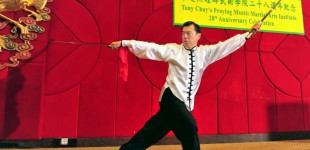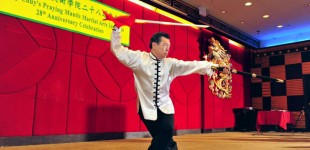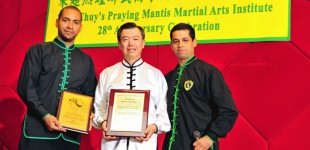Kungfu Louva-a-deus de Hong Kong
"The Mantis King"
Lai Kungfu Brasil é a maior escola de louva-a-deus kungfu do Brasil e está presente em 10 estados brasileiros, nos USA e no Reino Unido. A escola foi fundada em 1999, com a presença do Grão-Mestre Brendan Lai (1942-2002). O Instrutor Chefe Samuel Mendonça (phd), professor universitário há mais de 23 anos e instrutor de artes marciais desde 1986, já formou duas turmas de instrutores, uma em 2014 e outra em 2019. Ele é o responsável pelo desenvolvimento da linhagem do Grão-Mestre Brendan Lai e Mestre Tony Chuy no Brasil, que remetem ao "Rei" do louva-a-deus de Hong Kong, Grão-MestreWong Hon Funn.
Se você tem interesse em conhecer o genuíno louva-a-deus de Hong Kong, oriundo do Grão-Mestre Wong Hon Funn (Mantis King), aqui é o seu lugar. Instrutor Samuel Mendonça é discípulo do Grão-mestre Brendan Lai (Hong Kong/USA) e continua os seus estudos nos USA com o Mestre Tony Chuy, em NYC, seu irmão mais velho. Mendonça é graduado em Filosofia, com Mestrado em Ética (PUC Campinas), Doutorado em Filosofia da Educação (Unicamp), Pós-Doutorado (USP). É pesquisador do CNPq.
O livro A discourse on the history of praying mantis boxing in China for the last one hundred years, escrito pelo renomado pesquisador Wong Hon-Chiu, que foi professor nas universidades de Harvard, MIT e Pensilvânia, é nossa referência segura da linhagem de Hong Kong do louva-a-deus kungfu. Nossa escola prioriza o conhecimento sistemático e acadêmico e presta importante serviço à comunidade de arte marcial no Brasil ao enfatizar a importância dos estudos que ancoram a prática das artes marciais.
Instrutor Chefe Samuel Mendonça oferece aulas individuais ou para pequenos grupos em Campinas, SP. Mais informações pelo Instagram: @laikungfubrazil ou pelo WhatsApp: + 55 19 971541972.
Referências:
MENDONÇA, S. (org.) (2021). Praying Mantis Gungfu, Fighting, Self-improvement: Grandmaster Brendan Lai Legacy in Brazil. São Paulo: Pá de Palavra.
MENDONÇA, Samuel (org.) (2014). Brendan Lai: Praying Mantis System in Brazil. Campinas: Librum.
HON-CHIU, Wong (2014). A discourse on the history of praying mantis boxing in China for the last one hundred years. Hong Kong: Cosmosbooks.
Sejam bem vindos (as)!
Samuel Mendonça
Fabricio Pires - RJ - Master Tony Chuy NYC and Samuel Mendonça - SP
Master Tony Chuy Biography
Master Tony Chuy began his martial arts training at the age of 14 in Hong Kong, where he studied under Grandmaster Lam Hay who taught Northern Eagle Claw and Choy Lee Fut styles. He later studied the Praying Mantis system under Grandmaster Brendan Lai and Grandmaster Chiu, Chuk-Kai and became a disciple of the system.
Aside from his thorough knowledge of the Praying Mantis style, Master Chuy has studied and become proficient in various Northern and Southern Chinese weaponry. He has won many awards in black belt kata, weapons and full-contact tournaments. Master Chuy has also judged and refereed at various tournaments since 1979.
In the Spring of 1982, with the permission of his teachers, Master Chuy established the Praying Mantis Martial Art Institute in New York City. Aside from teaching in his own studio, Master Chuy also taught martial arts at the Overseas Chinese Television Network’s Actors Training Class and at the Transfiguration Church Chinese Language School. Over the years, Master Chuy and his students have participated in over 300 martial arts and lion dance performances at various celebrations, festivals, cultural events, parades, fund raising events, charitable and social occasions held throughout New York and New Jersey. Furthermore, Master Chuy has appeared on the covers of and has been featured in several martial arts magazines throughout the United States, China, Hong Kong and Japan.
Master Chuy’s goal is to further promote Chinese martial arts and share its philosophy and benefits with the West. His philosophy of studying and practicing the Chinese martial arts reflects the drive for perfection, and the utilization of discipline to improve one’s life. He believes the benefits of studying and practicing include not only improving health and physical fitness, but extend to the development of other attributes such as courtesy, respect, discipline, endurance and the improvement of one’s personality.


